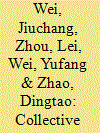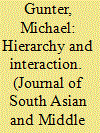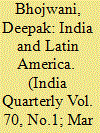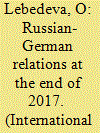|
|
|
Sort Order |
|
|
|
Items / Page
|
|
|
|
|
|
|
| Srl | Item |
| 1 |
ID:
131644


|
|
|
|
|
| Publication |
2014.
|
| Summary/Abstract |
Mass incidents are inevitable in contemporary China and the first thing we should learn is to adopt a correct attitude towards them. Based on the three elements-activity, interaction and sentiment-of collective behaviors in 52 mass incidents in China during 2007-2011, we find that collective behaviors in mass incidents show significant differences in activity, interaction and sentiment. A grade evaluation method is proposed to estimate the evolution of collective behaviors in 52 mass incidents and to classify such behaviors into five grades. Then the influence factors on the three elements are analyzed using multiple linear regression. The regression results demonstrate that the impacts of location, casualties, inner-group relations, group scale and duration on the three elements are very significant. Finally, in the light of the regression results, some implications of collective behavior in mass incidents are proposed for the relevant authorities in responding to mass incidents.
|
|
|
|
|
|
|
|
|
|
|
|
|
|
|
|
| 2 |
ID:
130545


|
|
|
|
|
| Publication |
2014.
|
| Summary/Abstract |
More than 30 years after it was founded as a small, violent, and isolated Kurdish party advocating Marxist revolution and the creation of a pan-Kurdish state, the Kurdistan workers Party (Partiyzz Karkaren Kurdistan) or PKK has both spawned and/or inspired a plethora of Kurdish nationalist organizations in Turkey. The rise of Kurdish nationalism, demands for Kurdish constitutional and legal rights, and need to establish new organizational names and identities to substitute for that of the
"terro1ist"-designated PKK help explain this Kurdish organizational proliferation. To the extent that the PKK has ignited Kurdish democratic self-determination, this article will analyze the broadly-based, complementary dynamics ol the various Kurdish nationalist groups in Turkey created over the years by the PKK (KCK]. VV hat are its components? Why were they created? How do they interact with each other? How successful has this movement been? Specifically analyzed are the PKK, KCK, BDP and the DTK in Turkey; and in the European diaspora, KON-KURD, KGK, KNK, EUTCC, Pl K, and CAMPACC, among others. The tentative conclusion is that this Kurdish movement has enjoyed enough success to promise an eventual solution to the long-simmering Kurdish problem in Turkey along the lines of democratic autonomy or democratic self-determination and thus will be fair to all parties.
|
|
|
|
|
|
|
|
|
|
|
|
|
|
|
|
| 3 |
ID:
127841


|
|
|
|
|
| Publication |
2014.
|
| Summary/Abstract |
India's relations with Latin America and the Caribbean are more recent than with any other region of the world, for geographical and historic reasons. This piece seeks to trace the early associations, leading up to the consolidation of political and diplomatic relations in the twentieth century, and the more recent phenomenon of exponential increase in commercial and economic relations in this century. The Indian official establishment has recognised the potential that region holds for business and energy security, but also realises that the relationship carries no political baggage. Recent developments on the political and economic front augur well for a strong partnership. Latin America also recognises India as an important global power and a market for its resources, as well as a partner in several business ventures. This essay traces the diplomatic and political relationship, as well as the commercial links that have been established across the region. It examines and outlines the complementarity, given the extensive Latin American resource base, Indian technology, entrepreneurial initiatives, etc., to portray a vision of an even more dynamic future relationship. This will encompass and encourage cultural links with spinoffs in tourism, film production, etc. Eventually, the growing political and economic relationship will lead to establishment of greater physical connectivity, abolishing the myth of distance.
|
|
|
|
|
|
|
|
|
|
|
|
|
|
|
|
| 4 |
ID:
157267


|
|
|
|
|
| Summary/Abstract |
THE LARGE AMOUNT of foreign policy work done by the Russian leadership in recent years has proven insufficient to fill gaps in social and economic statistics. This work mainly focused on measures to attract foreign investors and to raise the investment attractiveness of Russia. Measures to intensify cross-border movement of capital and attract "smart money" to Russia have been seriously impeded by economic determinism and overlooked many aspects of international relations.
|
|
|
|
|
|
|
|
|
|
|
|
|
|
|
|
|
|
|
|
|